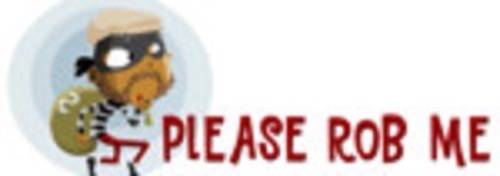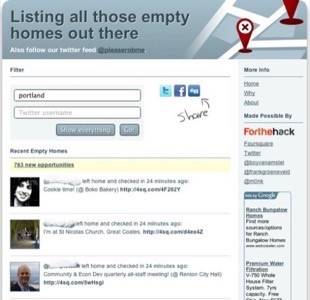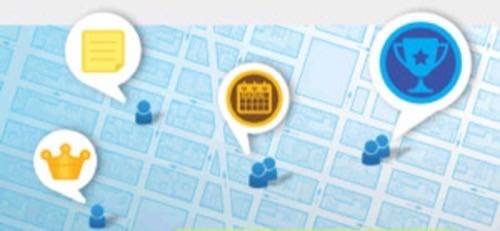Location-based social networks like Foursquare, Gowalla, Brightkite and Google Buzz are currently among the fastest growing new mobile services. All of these apps have one thing in common: they encourage you to share your current location with the rest of the world. By doing this, though, you are also telling people where you are not: at home. A new site, PleaseRobMe, plays on this theme and displays real-time updates from Foursquare users who broadcast their check-ins on Twitter.

According to the trio of developers behind the site (Barry Borsboom, Frank Groeneveld and Boy van Amstel), “the goal of this website is to raise some awareness of this issue and have people think about how they use services like Foursquare, Brightkite, Google Buzz etc.” There are also ads on the site, so the developers clearly also had something else in mind when they started this site. No matter the developers’ motivations, the visceral reaction to PleaseRobeMe on Twitter, shows that the developers have hit a nerve.

PleaseRobMe doesn’t show anything new that a regular Twitter search for the 4sq.com domain wouldn’t uncover, but it’s the first time that a service has made this information so blatantly obvious. We don’t think that a lot of thieves are actually trolling the Internet for information when people leave their homes, though we have already seen some burglaries where status updates may have played a role.
Besides robberies, there are also other reasons why you might want to keep your Foursquare profile private. Do you, after all, really want to tell your future employer that your spent all those weeknights at the local bar?
Privacy Concerns: The Limiting Factor for Location-Based Networks?
More importantly, though, this service highlights the privacy implications of regularly broadcasting your location. Some people are willing to take the risk and are perfectly fine with broadcasting their location and services like Foursquare reward these check-ins with virtual badges and real-world discounts for their most active users. For a lot of people, however, sharing location data takes online transparency one step too far.

Ultimately, the success of location-based networks will be limited if they can’t find ways to make users feel safe when using these services.
How to Stay Safe?
If you really feel the need to share your location with the whole world, then you have to accept the risks. This isn’t just limited to location-aware applications, though. Posting Twitter updates from your vacation also make it pretty obvious that you are not at home.
When it comes to location-aware services and geo-social networks, we prefer services that allow their users to send location updates privately to a select group of friends and trusted contacts. BrightKite – one of the older geo-social networks – for example, allows you to set very granular privacy controls on a per-post level. Of course, you could always resort to using a completely anonymous service like BlockChalk or a permission-based one-on-one service like EchoEcho, but with these, you can’t update your friends about what bar to meet them at either and the social aspects of these services are limited.
It would also be nice if these services allowed users to select the level of granularity of their check-ins. While this won’t discourage burglars (and doesn’t work for FourSquare-like apps), being able to just point to “Houston, TX” as your location instead of the actual hotel your are staying in could alleviate the fears of a lot of users.
The Dangers of Mixing the Virtual and the Real World
PleaseRobMe points out the dangers of location-based social networks. Services like Foursquare, Brightkite and Google Buzz bridge the gap between the virtual world of social networks and the real world, which is something we are not accustomed, to. It’s easy to think that the information we share online doesn’t have any influence on the real world, but PleaseRobMe makes it pretty clear that there can be real-world consequences to sharing your location.
What Do You Do?
What is your policy for staying safe on location-aware social networks? Do you avoid them at all cost? Do you think that the positive aspects outweigh the potential risks? Do you use a pseudonym and a fake avatar? Let us know in the comments.
















